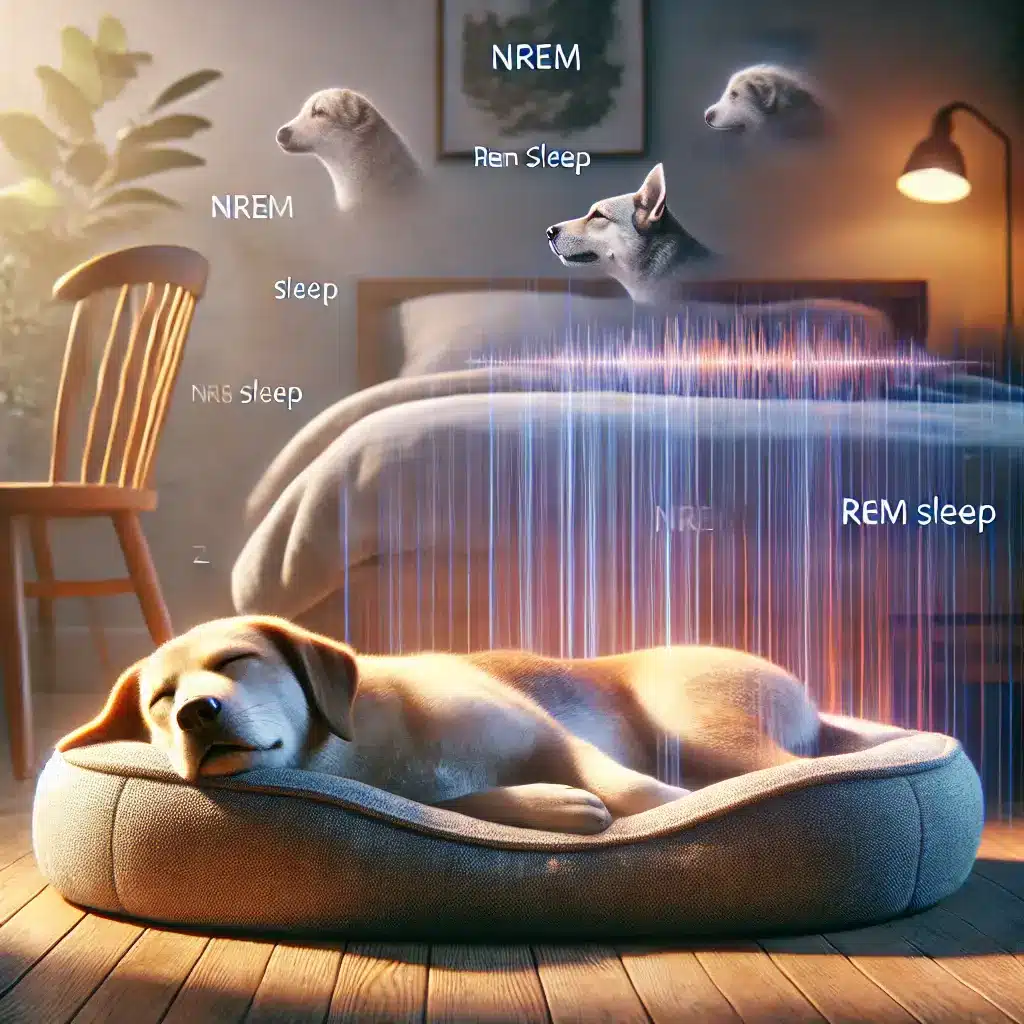Why Do Dogs Bark in Their Sleep? Understanding Your Pup’s Dreamy Woofs

Have you ever been jolted awake by your dog suddenly barking or whimpering in their sleep? You’re not alone! Many dog owners have witnessed this curious behavior, leaving them wondering what’s going on in their furry friend’s mind. Is it a dream? A nightmare? Or something else entirely?
In this blog, we’ll explore the fascinating world of canine sleep, uncover why do dogs bark in their sleep, and provide tips to ensure your pup gets the restful sleep they need. Let’s dive in!
How Do Dogs Sleep? Understanding Canine Sleep Cycles
Just like humans, dogs experience different stages of sleep, including Rapid Eye Movement (REM) and Non-REM (NREM) sleep. Here’s a breakdown:

- NREM Sleep: This is the deep, restorative sleep stage where your dog’s breathing slows, and their body relaxes. It’s essential for physical recovery and overall health.
- REM Sleep: This is the stage where dreams happen. During REM sleep, your dog’s brain is highly active, and you might notice their eyes moving under their eyelids, paws twitching, or even soft barks and whimpers.
It’s during REM sleep that your dog is most likely to bark, growl, or make other noises. But why does this happen?
Struggling with a noisy pup? Learn how to handle dogs barking and restore peace at home!
Why Do Dogs Bark in Their Sleep? The Science Behind Dreaming Dogs

Dogs, like humans, dream about their daily experiences. Whether it’s chasing a squirrel, playing fetch, or interacting with other dogs, their dreams can be vivid and intense. Here’s what’s happening:
Dreaming About Daily Activities:
If your dog barks or moves their paws during sleep, they might be reliving a fun day at the park or “chasing” something in their dream.
Emotional Processing:
Dogs process emotions during sleep, just like we do. A bark might indicate excitement, while a whimper could reflect anxiety or fear.
Physiological Responses:
During REM sleep, your dog’s brain sends signals to their body, causing involuntary movements or vocalizations. This is completely normal and usually harmless.
Tired of constant barking? Discover how to train your dog not to bark and enjoy a quieter home!
When Should You Be Concerned About Sleep Barking?
While occasional barking during sleep is normal, there are times when it might signal an underlying issue. Here’s what to watch for:
Excessive Barking:
If your dog barks frequently or intensely during sleep, it could indicate stress, anxiety, or discomfort.
Accompanying Symptoms:
Restlessness, pacing, or signs of distress (like panting or trembling) during sleep may require attention.
Sudden Changes:
If your dog’s sleep behavior changes abruptly, it’s worth consulting a veterinarian to rule out medical conditions like pain, cognitive dysfunction, or neurological issues.

Sleepless nights because of barking? Find out why your dog is barking at night and how to fix it!
How to Help Your Dog Sleep Peacefully
Creating a calm and comfortable sleep environment can reduce sleep barking and improve your dog’s overall well-being. Here are some practical tips:
1. Create a Cozy Sleep Space
- Provide a comfortable, supportive bed in a quiet area of your home.
- Add a soft blanket or a familiar toy to make the space feel safe and inviting.
2. Establish a Routine
- Dogs thrive on consistency. Set a regular bedtime and wake-up schedule to help regulate their sleep cycle.
- Incorporate calming activities before bed, like a gentle walk or cuddle session.
3. Ensure Adequate Exercise
- A tired dog is a happy sleeper! Regular physical activity helps burn off excess energy and promotes deeper, more restful sleep.
4. Minimize Environmental Stressors
- Use white noise machines or soft music to drown out loud noises that might startle your dog.
- Keep their sleep area away from high-traffic zones or noisy appliances.
5. Address Emotional Triggers
- If your dog seems anxious or stressed, consider consulting a professional trainer or behaviorist. They can help identify and address issues like separation anxiety or past trauma.

Could Diet Affect Your Dog’s Sleep?
Yes! A balanced diet plays a crucial role in your dog’s overall health, including their sleep quality. Foods rich in tryptophan (found in turkey, chicken, and fish) can promote relaxation and better sleep. Avoid feeding your dog heavy meals right before bedtime, as this can disrupt their rest.
If you’re unsure about your dog’s dietary needs, consult your veterinarian for personalized recommendations.
Final Thoughts: Embrace Your Dog’s Dreamy Adventures
Dog barking in sleep is a natural and often endearing behavior that reflects their active dream life. While occasional barking is nothing to worry about, paying attention to changes in frequency or intensity can help you spot potential issues early.
By creating a calming sleep environment, maintaining a consistent routine, and addressing emotional or physical concerns, you can ensure your furry friend enjoys peaceful, restful sleep. After all, a well-rested dog is a happy dog!






